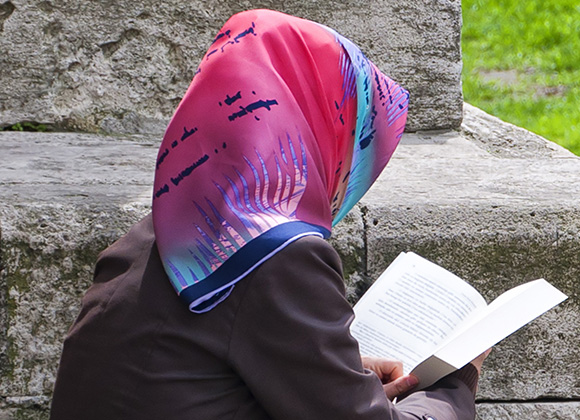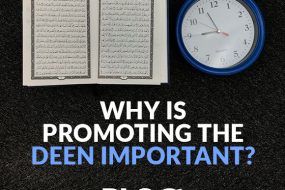
Please do not be surprised that domestic abuse exists in the Muslim community. Just about every ill that negatively impacts the general population, the Muslim community is also negatively impacted by the same ills. Domestic abuse sometimes called “domestic violence” has also made its appearance into the Muslim community worldwide. So, what does Allah ![]() say about how a husband and wife are to interact between each other?
say about how a husband and wife are to interact between each other?
Allah ![]() says, “Among His signs is this, that He created for you mates from among yourselves, that you may dwell in tranquility with them and He has put love and mercy between your (hearts): verily in that are signs for those who reflect” (Ar-Rum, 30:21).
says, “Among His signs is this, that He created for you mates from among yourselves, that you may dwell in tranquility with them and He has put love and mercy between your (hearts): verily in that are signs for those who reflect” (Ar-Rum, 30:21).
Prophet Muhammad ![]() further mentions how the wife should be treated. He
further mentions how the wife should be treated. He![]() advised, “I recommend that you treat women with goodness”. He
advised, “I recommend that you treat women with goodness”. He![]() never hit a women or child in his life. The purpose of marriage is to bring peace and tranquility between two people, not fear, intimidation, belittling, controlling or demonizing.
never hit a women or child in his life. The purpose of marriage is to bring peace and tranquility between two people, not fear, intimidation, belittling, controlling or demonizing.
What is Domestic Abuse?
Domestic violence or abuse occurs in domestic relationships when one person has more power and uses it to cause fear to the other person. There are many different forms of abuse including verbal threats, psychological, physical, sexual and destruction of property. It is against the law to physically harm or threaten another person. Domestic violence includes abuse directed at a spouse, child, sibling or senior parent.
What are some of the many types of abuses?
They are verbal threats, intimidation, humiliation, insults, ridicule, name-calling, dismissing, ignoring, destructive criticism, spying, making the wife feel worthless; restricting her access to transportation, health care, food, clothing, money, friends and social services; murder, maiming, pushing, kicking, slapping, punching, beating, weapon assault, bondage; making fun of her when she prays, her modest Islamic dress or reads the Qur’an and others.
The Prophet![]() said, “Among the Muslims the most perfect as regards his faith is the one whose character is most excellent and the best among you are those who treat their wives well.”1
said, “Among the Muslims the most perfect as regards his faith is the one whose character is most excellent and the best among you are those who treat their wives well.”1
![]() Statistically in the United States, every 15 seconds, a woman is beaten. About 1 in 4 women are likely to be abused by a partner in her lifetime, police receive 1,300 calls a day from women saying they have been physically abused and a horrific two women a week are being killed by their partners. Also, according to a 2013 global review of available data, 35 per cent of women worldwide have experienced either physical and/or sexual intimate partner violence or non-partner sexual violence.
Statistically in the United States, every 15 seconds, a woman is beaten. About 1 in 4 women are likely to be abused by a partner in her lifetime, police receive 1,300 calls a day from women saying they have been physically abused and a horrific two women a week are being killed by their partners. Also, according to a 2013 global review of available data, 35 per cent of women worldwide have experienced either physical and/or sexual intimate partner violence or non-partner sexual violence.
The following are quick glances at the cycle of violence, non-physical indicators of abuse, warnings signs of abuse, danger assessment and safety plans.
Here are the three phases of the cycle of violence:
Phase One:
Tension Building
- Batterer experiences increased tension
- Victim minimizes problems
- Batterer increases threats
- Victim withdraws
- Batterer controls more
- Tension becoming intolerable
- Victim feels like they are walking on eggshells
- Poor communication
Phase Two:
Abusive Incident
- Batterer unpredictable; believes he is losing control
- Victim is helpless; feels trapped
- Batterer highly abusive, incident occurs
- Incidence of violence or threat occurs
- Batterer blames victim
Phase Three:
Honeymoon Period
- Batterer is loving, apologetic and attentive
- Victim has mixed feelings
- Batterer is manipulative
- Victim feels guilty and responsible
- Batterer promises change
- Victim considers reconciliation
- Victim often recants/minimizes abuse
In part II, we will learn more about this important topic. We would love to hear your thoughts. Please leave them below in the comments section. 🙂
- At Tirmidhi ↩








3 replies on “Domestic Abuse: The Silent Violence in the Muslim Community [Part I]”
[…] part I, we learned about the different cycles of domestic abuse. In this article, we will explore non […]
Masha Allah..Very informative.
This is a huge problem within the community, in which I know firsthand. Unfortunately, most of the leaders within our communities refuse to get involved to help these victims of abuse, especially if it means granting the victims a divorce.
May Allah guide us all.